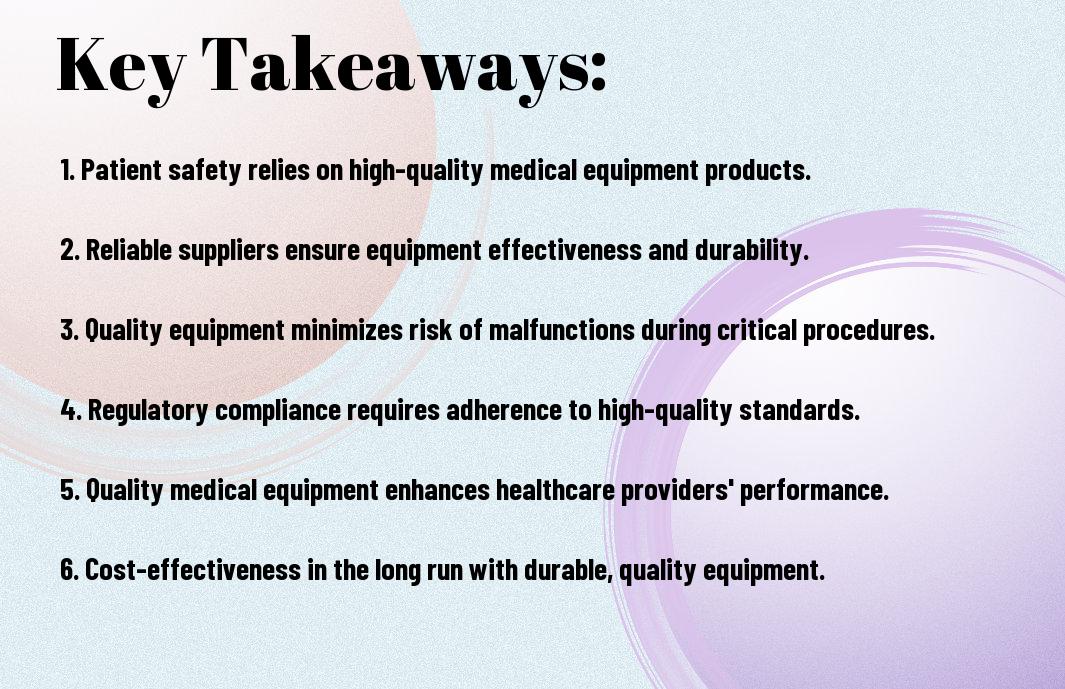With the ever-evolving landscape of healthcare, selecting a reliable medical equipment supplier is paramount. Ensuring top-notch quality in the products provided can significantly impact patient care, treatment outcomes, and overall operational efficiency. To examine deeper into the importance of quality in medical equipment, check out this insightful article on Why Quality Assurance is Important I Medical Devices…

Key Takeaways:
- Reliability: Choosing a quality medical equipment supplier ensures reliability in terms of product performance and durability.
- Patient Safety: Quality medical equipment is crucial for ensuring patient safety and delivering effective healthcare services.
- Regulatory Compliance: Working with a reputable supplier guarantees compliance with industry regulations and standards, preventing legal issues.
- Long-Term Cost Savings: Investing in quality equipment may come with a higher initial cost but can lead to long-term savings due to reduced maintenance and replacements.
- Enhanced Reputation: Partnering with a reliable supplier enhances the reputation of healthcare facilities, instilling trust among patients and practitioners.

The Consequences of Low-Quality Medical Equipment
Patient Safety Risks
A critical consequence of low-quality medical equipment is the increased risk it poses to patient safety. Substandard equipment may malfunction during crucial procedures, leading to potential errors in diagnosis or treatment. This not only jeopardizes patient outcomes but also exposes healthcare providers to medical malpractice risks. To ensure the highest standard of care, healthcare facilities must prioritize the quality and reliability of the equipment they invest in.
Furthermore, using low-quality medical equipment can compromise the accuracy of medical tests and readings, potentially leading to misdiagnoses. In situations where precision is key, such as in surgical settings or emergency care, the reliance on faulty equipment can have severe consequences. Patients trust that healthcare providers have access to top-notch tools and technology, making it imperative to select suppliers who prioritize quality and safety above all else.
Inadequate medical equipment can also result in delays in patient care, as equipment failures may require time-consuming troubleshooting or replacement. This can not only impact individual patients but also strain the overall efficiency of healthcare facilities. By investing in high-quality equipment from reputable suppliers, healthcare providers can minimize the risks associated with equipment failure and ensure smooth operations.
Financial Implications for Healthcare Facilities
Medical facilities that opt for low-quality equipment may face significant financial implications in the long run. While the upfront costs of substandard equipment may seem appealing, the expenses associated with frequent repairs, replacements, and potential legal issues can quickly add up. Additionally, the reputational damage that can result from safety incidents or equipment failures may deter patients and impact the facility’s bottom line.
Understanding the total cost of ownership is crucial when selecting medical equipment suppliers. While high-quality equipment may involve a larger initial investment, the long-term savings and benefits in terms of reliability, durability, and patient satisfaction far outweigh the upfront costs. By prioritizing quality and reliability in equipment procurement decisions, healthcare facilities can safeguard their finances and reputation while ensuring the highest standard of care for their patients.
What to Look for in a Quality Medical Equipment Supplier
Regulatory Compliance and Certifications
It is necessary to ensure that any medical equipment supplier you choose complies with regulatory standards and holds the necessary certifications. Regulatory compliance indicates that the supplier meets the required quality and safety standards set by regulatory bodies, such as the FDA or CE. Certifications, such as ISO 13485 for medical device quality management systems, provide further assurance of the supplier’s commitment to quality.
Choosing a supplier that adheres to regulatory requirements helps mitigate risks associated with using medical equipment that may not meet safety standards. It also demonstrates the supplier’s dedication to maintaining quality and meeting industry regulations, which is crucial for ensuring the efficacy and safety of medical equipment.
Partnering with a supplier that prioritizes regulatory compliance and certifications can help your facility uphold its reputation for providing high-quality care while minimizing the potential for regulatory violations or safety issues related to medical equipment.
Product Testing and Validation
Quality medical equipment suppliers invest in product testing and validation processes to ensure that their products meet performance and safety standards. They conduct rigorous tests to verify the reliability, accuracy, and durability of the equipment before it reaches customers. This systematic approach to testing helps identify any potential issues early on and ensures that the equipment functions as intended.
The product testing and validation phase is crucial for confirming that the medical equipment meets industry standards and specifications. By partnering with a supplier that prioritizes thorough testing and validation, you can have confidence in the quality and reliability of the equipment you purchase for your facility.
The commitment to product testing and validation reflects the supplier’s dedication to delivering safe and effective medical equipment that healthcare professionals can rely on to provide optimal care for their patients.

The Benefits of Partnering with a Reputable Supplier
Improved Patient Outcomes
Keep in mind that the quality of medical equipment directly impacts patient outcomes. When hospitals partner with reputable suppliers that offer high-quality and reliable equipment, they are enhancing the level of care and treatment they can provide to their patients. High-quality equipment not only ensures accurate diagnosis and treatment but also contributes to patient safety and overall satisfaction.
Investing in top-notch medical equipment from a trusted supplier can lead to improved efficiency in healthcare delivery. Reliable equipment means fewer malfunctions or downtime, enabling healthcare providers to focus on delivering timely and effective care to patients. This efficiency can ultimately result in better patient outcomes, shorter hospital stays, and improved overall healthcare experiences for individuals seeking treatment.
Furthermore, partnering with a reputable supplier means access to the latest advancements in medical technology. Cutting-edge equipment can lead to more precise diagnoses, minimally invasive procedures, and better treatment outcomes for patients. Hospitals that prioritize quality in their choice of equipment suppliers are better positioned to stay at the forefront of medical innovation and provide superior care to their patients.
Enhanced Hospital Reputation
One significant benefit of partnering with a reputable medical equipment supplier is the positive impact it can have on a hospital’s reputation. Hospitals known for using high-quality equipment from trusted suppliers are perceived as more reliable, technologically advanced, and committed to providing the best possible care to their patients. This reputation can attract top medical professionals, specialists, and even patients seeking state-of-the-art healthcare services.
What Factors Should I Consider When Evaluating the Quality of a Medical Equipment Supplier?
When evaluating the quality of a medical equipment supplier, there are several factors to consider. First, look for a supplier with a strong track record of reliability and customer satisfaction. Second, ensure they offer a wide range of high-quality products at competitive prices. These best medical equipment supplier tips can help guide your decision.
Conclusion
With this in mind, it is evident that the quality of medical equipment plays a crucial role in ensuring the safety and well-being of patients. Choosing the right supplier who provides high-quality equipment can make a significant difference in the effectiveness of medical treatments and the overall outcomes of patient care. By prioritizing quality when selecting a supplier, healthcare facilities can enhance the reliability and efficiency of their operations, ultimately leading to better patient outcomes.
Furthermore, the importance of quality extends beyond the individual patient to the reputation and success of the healthcare facility as a whole. Investing in top-notch medical equipment from reputable suppliers not only instills confidence in patients but also sets the standard for excellence in healthcare delivery. By maintaining high standards of quality in equipment selection, healthcare facilities can differentiate themselves in a competitive market and attract more patients seeking the best possible care.
Lastly, when it comes to choosing a medical equipment supplier, quality should always be the top priority. The impact of quality on patient outcomes, operational efficiency, and overall reputation cannot be overstated. By partnering with suppliers who prioritize quality in their products and services, healthcare facilities can elevate the standard of care they provide and ensure the best possible outcomes for their patients.
FAQ
Q: Why is quality important when choosing a medical equipment supplier?
A: Quality is crucial because it directly impacts patient care and safety. Substandard equipment can lead to errors in diagnosis and treatment, jeopardizing patient well-being.
Q: How does the quality of medical equipment affect healthcare professionals?
A: High-quality equipment enhances the efficiency and accuracy of healthcare professionals, allowing them to deliver better outcomes and improve overall patient satisfaction.
Q: What are the consequences of choosing a low-quality medical equipment supplier?
A: Opting for a low-quality supplier can result in frequent breakdowns, increased maintenance costs, and the need for premature equipment replacement, ultimately impacting the financial health of a healthcare organization.
Q: How can one assess the quality of a medical equipment supplier?
A: One can evaluate the quality of a supplier by assessing the certifications they hold, checking for compliance with industry standards, and researching their reputation and customer reviews.
Q: What are the long-term benefits of prioritizing quality in medical equipment procurement?
A: Prioritizing quality in equipment procurement leads to enhanced patient outcomes, improved operational efficiency, reduced downtime, and ultimately, cost savings in the long run.



